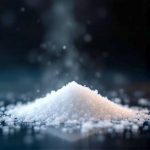Takeaways
- Sodium helps regulate fluid balance, easing bloating[1]
- Proper sodium intake supports healthy digestion[2]
- Low sodium levels can paradoxically cause bloating[3]
- Sodium-rich foods and supplements may relieve symptoms[4]
- Balancing sodium with hydration is essential[5]
- Lifestyle changes enhance sodium’s bloating-relief benefits[6]
Understanding Sodium and Bloating
Sodium is an essential mineral that helps regulate the amount of water your body retains. This water retention directly influences bloating, which is a feeling of swelling in the abdomen.
While many associate sodium with causing bloating, it can actually be helpful in maintaining fluid balance. Consuming the right amount of sodium is important for keeping fluids balanced in your body and preventing discomfort.
It might seem counterintuitive, but sodium can sometimes alleviate bloating symptoms. This article will explore the ways sodium affects bloating and how to use it to find relief.
The Science Behind Sodium and Fluid Balance
Osmosis and Electrolyte Regulation
Sodium plays a key role in moving water in and out of your body’s cells through a process called osmosis. This process helps maintain the proper fluid balance throughout the body.
As an electrolyte, sodium helps control where water moves within your body, working alongside other minerals to maintain balance. This balance is crucial for preventing bloating.
Sodium’s Impact on Bloating
The level of sodium in your body affects how much water it holds. Too much sodium can lead to water retention[7] , while too little can also cause fluid imbalance problems.
There is a link between the amount of sodium you consume and how bloated you might feel. Finding the correct balance of sodium can help you reduce that uncomfortable, swollen sensation.
Sodium Deficiency and Bloating
When sodium levels in the body drop too low, a condition called hyponatremia occurs. This can cause a variety of symptoms, including, unexpectedly, bloating.
When your sodium levels are too low, your body tries to conserve water, which can result in swelling and bloating. This is quite the opposite of what many people would expect.
| Sodium Deficiency | Sodium Excess |
|---|---|
| Nausea | Thirst |
| Headache | High blood pressure |
| Fatigue | Swelling |
| Muscle cramps | Stomach discomfort |
| Bloating | Bloating |
Maintaining the proper level of sodium is important for overall bodily function, including the healthy operation of your digestive system.
Optimal Sodium Intake for Bloating Relief
The recommended daily sodium intake for adults is approximately 1,500 mg.[8] This amount generally helps prevent bloating for most people, although individual needs vary.
Your sodium requirements can fluctuate based on factors such as your activity level and how much you sweat, so consider these when assessing your intake.
Several factors influence an individual’s sodium needs:
- Activity level
- Climate
- Age
- Health conditions
- Medications
To manage bloating, it is helpful to pay attention to how your body responds to sodium intake. Adjust your consumption based on how you feel, as even small changes can make a notable difference.
Sodium-Rich Foods to Combat Bloating
Consuming natural foods that contain sodium can be helpful in alleviating bloating. These foods not only provide sodium but also include other essential nutrients that support healthy digestion.
Incorporating these foods into your diet can reduce bloating by providing sodium, fiber, or probiotics. Both fiber and probiotics support good digestive function.
| Food | Sodium per Serving |
|---|---|
| Pickles | 785 mg |
| Miso soup | 630 mg |
| Olives | 400 mg |
| Cottage cheese | 350 mg |
| Sauerkraut | 325 mg |
When adding these foods to your meals, do so mindfully. Combine them with fresh fruits and vegetables for optimal results. A little bit of these foods can go a long way.
Sodium Supplementation for Bloating
Types of Sodium Supplements
Various types of sodium supplements are available, each with a slightly different method of aiding with bloating.
The most common form of sodium is table salt, also known as sodium chloride. Other forms include sodium bicarbonate and sodium citrate, which can influence your body’s pH balance.
Proper Usage and Dosage
It’s important to use sodium supplements safely by beginning with small amounts and carefully observing how your body reacts.
Always consult a doctor before starting any supplements. They can help you identify the appropriate dosage based on your individual needs, which is especially important for those with existing health issues.
Lifestyle Changes to Complement Sodium Intake
Making some lifestyle adjustments can help your body use sodium effectively to reduce bloating, as these changes support better overall digestive health.
Combining proper sodium intake with other healthy strategies works best. This combination provides a well-rounded approach for managing bloating.
Here are some helpful steps for reducing bloating:
- Eat slowly
- Avoid gassy foods
- Stay hydrated
- Exercise regularly
- Manage stress
These adjustments, alongside maintaining appropriate sodium levels, can greatly reduce bloating. They can also improve your digestive health and comfort.
Potential Risks of Excessive Sodium Intake
Consuming too much sodium can lead to health issues, such as high blood pressure and heart problems. In some instances, excess sodium can actually worsen bloating.
Excess sodium doesn’t always help with bloating; it can cause water retention. This can lead to that swollen and uncomfortable feeling.
Here are some signs of excess sodium intake:
- Increased thirst
- Swelling in hands and feet
- Headache
- Stomach discomfort
It’s crucial to find the right amount of sodium to manage bloating without causing other health problems.
Sodium and Hydration for Bloating Relief
Sodium and water have a close relationship within the body. A correct balance of both is necessary to prevent bloating, while too much or too little of either can lead to problems.
Proper hydration helps maintain a healthy sodium balance. This balance helps your body use sodium effectively, which can decrease bloating and boost overall comfort.
Drinking water throughout the day is beneficial, but don’t overdo it. Consuming too much water can dilute your sodium levels, potentially leading to bloating.
Exercise and Sodium Balance for Reducing Bloating
Exercise impacts how your body utilizes sodium. You lose sodium through sweat, which can affect bloating, particularly following a workout.[9]
Losing sodium through sweat can sometimes help reduce bloating. However, losing too much can cause problems, so it’s important to replenish what you lose.
Before exercising, have a small snack with a little salt. During prolonged workouts, consider a sports drink. After exercise, eat a balanced meal. Following these steps will help maintain your sodium levels and prevent bloating.
Sodium’s Role in Digestive Health and Bloating
Sodium is involved in digestion by helping your body absorb nutrients. This process can influence the amount of gas and bloating you may experience.
A healthy digestive system requires adequate sodium to break down food effectively.[10] Proper food breakdown can reduce gas production and bloating.
The connection between your gut and sodium is complex. Balanced sodium levels support good gut bacteria. These bacteria help to prevent bloating and other digestive issues.
FAQ: People Also Ask
Can sodium help reduce bloating?
How much sodium should I consume to ease bloating?
Are there any risks to using sodium for bloating relief?
What foods high in sodium can help with bloating?
How does sodium affect water retention and bloating?
Can low sodium levels cause bloating?
Is it safe to take sodium supplements for bloating?
How does exercise impact sodium levels and bloating?
Can increasing sodium intake worsen bloating in some cases?
What’s the connection between sodium, hydration, and bloating?
Sodium plays a complex and varied role in the body, impacting fluid balance, digestion, and more. Understanding this role can help you better manage bloating.
Managing sodium intake involves more than just avoiding salt; it is about finding the right balance for your body. This balance can greatly reduce bloating and improve your overall comfort.
Individual sodium needs vary. What works for one person may not be suitable for another. Monitor how your body reacts to changes in your sodium intake.
Combining appropriate sodium management with other healthy habits is essential. Regular exercise, proper hydration, and a balanced diet all contribute to reducing bloating.
If you consistently experience bloating, examine your sodium intake, as it might be too high or too low. Making minor adjustments can lead to significant improvements in how you feel.
Always consult with a healthcare professional before making significant dietary changes. They can provide personalized advice tailored to your specific health needs and objectives.
By understanding the link between sodium and bloating, you can take control of your digestive health. With the right approach, you can experience relief and greater comfort daily.
Sodium is an electrolyte that is essential for maintaining fluid balance in the body. Proper sodium levels help regulate the movement of water in and out of cells, preventing excessive fluid retention that can lead to bloating. While excess sodium can cause bloating, adequate sodium intake is crucial for fluid balance.
Source: “Quality of fluid balance charting and interventions to improve it: a systematic review” https://www.ncbi.nlm.nih.gov/pmc/articles/PMC10729040/
Sodium plays a role in digestive processes by helping the body to absorb nutrients and break down food. Balanced sodium levels can contribute to proper digestive function and minimize issues like gas production and bloating. However, the exact mechanisms are still being researched.
Source: “Quality of fluid balance charting and interventions to improve it: a systematic review” https://www.ncbi.nlm.nih.gov/pmc/articles/PMC10729040/
When sodium levels drop too low (hyponatremia), the body attempts to conserve water, leading to swelling and bloating, which is counterintuitive for many people.
Source: “Quality of fluid balance charting and interventions to improve it: a systematic review” https://www.ncbi.nlm.nih.gov/pmc/articles/PMC10729040/
If bloating is due to low sodium levels, consuming sodium-rich foods or supplements may help restore balance and reduce symptoms. However, it’s important to monitor intake carefully and consult with a healthcare professional to determine the right balance to avoid excess intake. The effectiveness varies by the individual and underlying cause of the bloating.
Source: “UEG Week 2019 Poster Presentations” https://www.ncbi.nlm.nih.gov/pmc/articles/PMC8454868/
Sodium and water have a close relationship within the body. Proper hydration helps maintain a healthy sodium balance. A correct balance of both is necessary to prevent bloating, while too much or too little of either can lead to problems. Drinking too much water without sufficient electrolytes can dilute sodium levels.
Source: “Quality of fluid balance charting and interventions to improve it: a systematic review” https://www.ncbi.nlm.nih.gov/pmc/articles/PMC10729040/
Lifestyle adjustments such as regular exercise, proper hydration, and a balanced diet can help optimize how the body uses sodium, thereby improving digestive health and reducing bloating. These changes should be paired with attention to individual sodium needs.
Source: “Quality of fluid balance charting and interventions to improve it: a systematic review” https://www.ncbi.nlm.nih.gov/pmc/articles/PMC10729040/
When there’s too much sodium in the body, it can lead to fluid retention as the body attempts to dilute the excess sodium concentration. This can lead to bloating, a swollen and uncomfortable feeling.
Source: “Quality of fluid balance charting and interventions to improve it: a systematic review” https://www.ncbi.nlm.nih.gov/pmc/articles/PMC10729040/
The American Heart Association has set a goal of limiting sodium intake to 1500 mg a day, but the appropriate level can vary depending on individual health, activity level, and other factors. Other organizations may suggest a higher intake as a safe minimum.
Source: “Sodium, blood pressure, and cardiovascular disease: further evidence supporting the American Heart Association sodium reduction recommendations” https://pubmed.ncbi.nlm.nih.gov/23124030/
During exercise, particularly intense or prolonged workouts, the body loses sodium through sweat. This loss can affect the body’s electrolyte balance, which in turn can impact fluid retention and cause bloating if not managed correctly with hydration and balanced nutrition. It is important to replace lost sodium through sports drinks, salty snacks and balanced post workout meals.
Source: “Quality of fluid balance charting and interventions to improve it: a systematic review” https://www.ncbi.nlm.nih.gov/pmc/articles/PMC10729040/
Adequate sodium is required for certain aspects of digestion, including proper nutrient absorption and breakdown of food. This can have an impact on gas production and bloating, contributing to overall digestive health. The specific mechanisms are still being studied.
Source: “Quality of fluid balance charting and interventions to improve it: a systematic review” https://www.ncbi.nlm.nih.gov/pmc/articles/PMC10729040/



